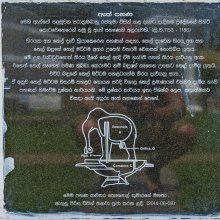Anuva, Anuvā, Anu-va: 3 definitions
Introduction:
Anuva means something in Hinduism, Sanskrit. If you want to know the exact meaning, history, etymology or English translation of this term then check out the descriptions on this page. Add your comment or reference to a book if you want to contribute to this summary article.
Images (photo gallery)
(+12 more images available)
Languages of India and abroad
Sanskrit dictionary
Source: Cologne Digital Sanskrit Dictionaries: Cappeller Sanskrit-English DictionaryAnuvā (अनुवा).—blow towards or after ([accusative]), inflame, rouse.
Anuvā is a Sanskrit compound consisting of the terms anu and vā (वा).
Source: Cologne Digital Sanskrit Dictionaries: Monier-Williams Sanskrit-English Dictionary1) Anuvā (अनुवा):—[=anu-vā] 1. anu-√vā [class] 2. [Parasmaipada] -vāti, to blow upon, blow along or after, [Ṛg-veda etc.]
2) [v.s. ...] 2. anu-vā f. blowing after, [Taittirīya-saṃhitā] (cf. anuvā.).
Sanskrit, also spelled संस्कृतम् (saṃskṛtam), is an ancient language of India commonly seen as the grandmother of the Indo-European language family (even English!). Closely allied with Prakrit and Pali, Sanskrit is more exhaustive in both grammar and terms and has the most extensive collection of literature in the world, greatly surpassing its sister-languages Greek and Latin.
Kannada-English dictionary
Source: Alar: Kannada-English corpusAṇuva (ಅಣುವ):—[noun] a famous semi god, of monkey-like beings, and a trusted servant of Rāma, popularly known as Hanumān or Añjanēya.
Kannada is a Dravidian language (as opposed to the Indo-European language family) mainly spoken in the southwestern region of India.
See also (Relevant definitions)
Starts with (+186): Anuvac, Anuvacaka, Anuvacana, Anuvacanapraisha, Anuvacaniya, Anuvacca, Anuvaccia, Anuvaceti, Anuvach, Anuvachana, Anuvacin, Anuvacisu, Anuvacita, Anuvad, Anuvada, Anuvadacihne, Anuvadadhikarana, Anuvadaka, Anuvadakatva, Anuvadaki.
Ends with: Alakanuva, Chanuva, Chhanuva, Curanuva, Hanuva, Kanuva, Manuva, Niphanuva, Tanuva.
Full-text: Anuvas, Anuvasita, Anva, Anuvasana, Anuvasya, Anuvamta, Anuvasaniya, Anuvasin, Anuvaseti, Anuma, Anvartitar, Anvartishye, Samanuvas, Anuvasha, Anuvate, Jambila, Anuvata, Anuvartman, Idvatsara.
Relevant text
Search found 2 books and stories containing Anuva, Anu-va, Anu-vā, Anuvā, Aṇuva; (plurals include: Anuvas, vas, vās, Anuvās, Aṇuvas). You can also click to the full overview containing English textual excerpts. Below are direct links for the most relevant articles:
Sushruta Samhita, volume 3: Sharirasthana (by Kaviraj Kunja Lal Bhishagratna)
Brihadaranyaka Upanishad (by Swāmī Mādhavānanda)





